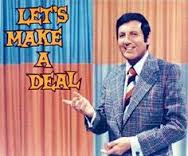Bargaining with God
Be honest: at pivotal life moments – maybe when you thought nobody else was listening – you bargained with God. Maybe it was immature jitters (“Lemme get an ‘A’ on this test and I’ll be good forever!”); maybe it was mature worry (“Let the test results be negative and I promise to quit smoking”). Whether faith, emotion or desperation, it’s human nature to bargain with God (or the Universe, or Fate, or Something) amidst challenge. The issue isn’t whether we bargain with God, but what our bargaining means and what we make of it.
In this week’s Torah portion (Vayera), Abraham bargains with God over the fate of Sodom and Gomorrah: would God save the cities for 50 righteous? 40 righteous? How about 10?(Gen. 18:23-33). The Rosh Hashanah morning Haftarah finds Hannah bargaining with God: if God gives me a son (Samuel), I’ll dedicate him to God’s service (1 Sam. 1:11). Jacob, on waking from his dream of an angelic ladder, also bargains with God: if God protects me my journey, I’ll tithe all I have for God (Gen. 28:20-22).
Our biblical bargainers seemed to fare well: Abraham couldn’t save Sodom but did get a personalized dialogue with God. Hannah got a son. Jacob felt God protecting his journey. Other bargainers don’t fare so well: modern hospitals and courtrooms overflow with pleas seemingly unheeded and bargains seemingly rejected. And still, we bargain.
In her landmark 1969 treatise, Elisabeth Kübler-Ross called bargaining one of the five stages of grief (like denial, anger, depression and acceptance). In its wake, some imagine bargaining to be a behavior of desperation, or a psychological stage to get past like a bad part of town en route to somewhere better. It’s tempting to suppress bargaining instincts in service of reason and playing it safe. (After all, bargaining with God is risky business: how would losing, or feeling ignored, affect what we think and feel about God?)
We probably can’t know whether God hears and answers our pleas on the terms we bargain for: not everyone is cured, not everyone is exonerated, not every bargain is honored. But the fairest measure of bargaining isn’t always winning an outcome: the Integrative Theory of Bargaining includes our emotions as bargaining outcomes. We feel better speaking our hopes and fears aloud – as Kübler-Ross confirmed, it’s good for us psychologically. And as Narrative Theorists teach, bargaining is part of who we are as humans (and, perhaps stereotypically, as Jews): calling out to God (or the Universe, or Fate, or Something) is part of our emotional and spiritual DNA. To suppress our bargaining instinct is to suppress an essential part of ourselves. Speaking to God, even bargaining with God, is sound spirituality.
So take a page from Abraham, Hannah and Jacob: feel free to bargain with God. We may or may not get what we bargain for, but we’re sure to come away with more of ourselves.
R’ David Evan Markus






 Evan J. Krame was ordained as a rabbi by the
Evan J. Krame was ordained as a rabbi by the